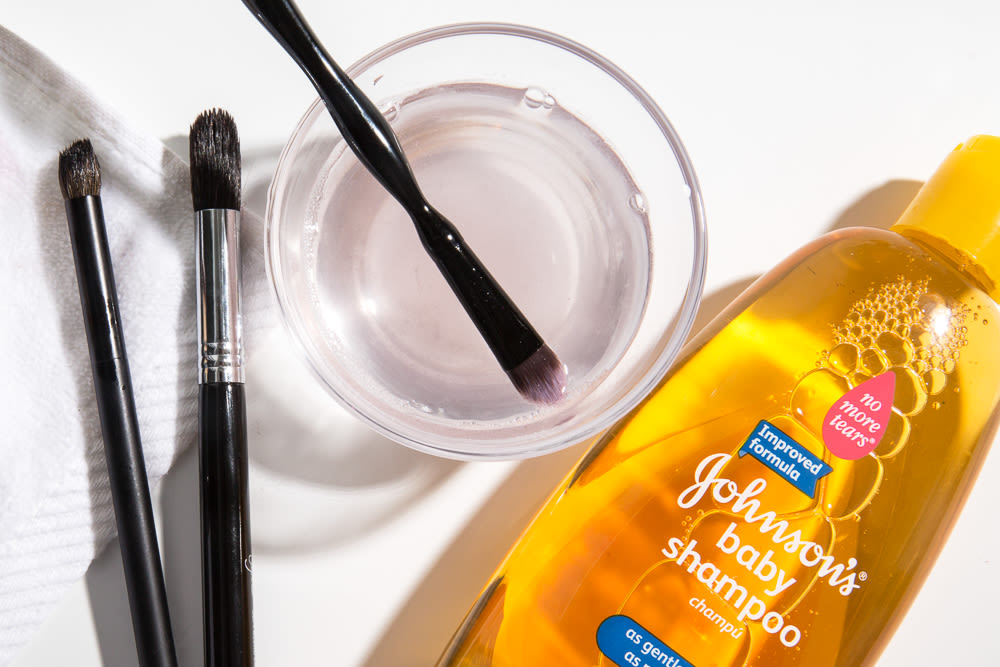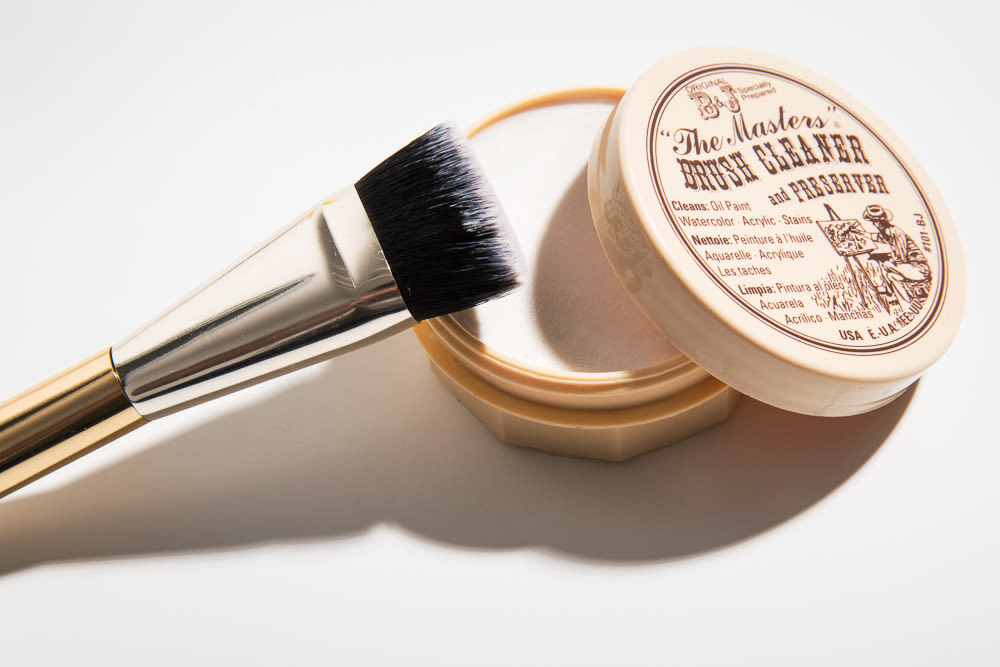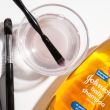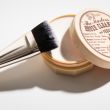WikiHow might have a perfectly fine article on how to clean the excess makeup, oil, dirt, and bacteria off of your contour, eyeshadow, and foundation brushes—but why settle for generic when you have Tom Pecheux on the line? In honor of spring cleaning Mr. Pecheux, as well as six other makeup artists who routinely lend their talents backstage and at editorial shoots, chimed in when we asked about their techniques for keeping their tools clean between the many faces they touch.
Tom Pecheux: “I like to use an organic soap to clean my brushes. Something like Savon De Marseille Olive Oil Soap, which I prefer in a bar, so that I can rub my brushes directly onto the bar of soap. I do this after each time I use my brushes. Once in a while, when I don’t have to work the following day, I wash with the bar soap and let my brushes chill over an air conditioner to soften them. If I’m in a rush, I will set them on top of a radiator, and if I really don’t have time, I will put a blow dryer to them. It is important to let them dry naturally and standing up so the shape is restored. For synthetic brushes, like lip and concealer brushes, I use hand sanitizer on them after each use.”
Beau Nelson: “I clean my brushes using the Beautyblender Solid Blendercleanser for natural hair brushes, which is great for me because it’s portable, and I can take it anywhere without it leaking all over the place. Occasionally, I condition my natural hair brushes with hair conditioner and leave them to soak it in for an hour or so. For synthetic brushes, I use dish soap like Dawn, which helps cut through the cosmetic oils and silicones used in makeup that can be hard to get out. The number one thing I’ve found that I love is the Sigma Beauty Spa Brush Cleaning Glove. It looks crazy, but that in combination with the Blendercleanser gets my brushes cleaner than ever was possible before.”
Lottie: “I shampoo my brushes with unscented Savon de Marseille Bar Soap. Then, I lay them flat to dry overnight. I use dish soap for stubborn grease paints or glitter in brushes, but I only use synthetic brushes for these things so that the hairs are not destroyed.”
Mario Dedivanovic: “To clean my brushes, I first wet them thoroughly with water and rub them gently onto a bar of antibacterial soap. I then rinse them with warm water and wash one more time with a gentle shampoo— Johnson's Baby Shampoo works well. I like to mix a couple drops of tea tree oil with the shampoo because it has antiseptic benefits, and it also leaves the brushes smelling great. I give a final rinse, squeeze them out gently with my fingers, and lay them on a clean towel to dry.”
Gucci Westman: “I like using the Éminence Organics Natural Brush Cleanser. I also found an Organic Lavender Brush Cleanser from Afterglow Cosmetics, which is great! I clean my brushes every day after I use them and deep clean once a week since lots of bacteria can accumulate in brushes, and I am a clean freak with my kit. For the deep cleaning, I use Rahua Shampoo. I put the cleanser in a cap and dip the brush in. After I wash them, I let them dry on a towel. Sometimes I spray them, depending on time—if I am catching a flight or in a rush, I spray and try to make sure they are dry as possible before putting them in the brush cases so that they don’t lose shape and the hairs stay intact.”
Hung Vanngo: “I am a neat freak, so I clean my brushes after every single makeup look. To clean the brushes, I pour liquid brush cleanser into a little bowl and then dip in one brush at a time, swirling the brush around in the bowl . I usually leave the foundation and concealer brush for last. After that, I use tissues to soak up most of the liquid on the brushes, then lay them all flat on top of a paper towel to dry. For lip brushes and brushes that I use with heavy pigments, I use The Masters' Brush Cleaner and Preserver because it can strip off all the oils and pigments. This is made to clean painter’s brushes, so you can get it at any art supply store.”
[Brigitte Reiss-Andersen)(http://into.gl/1GdOiZT): “Dirty brushes tend to not distribute powders properly because of the yucky build up. I never use water because it makes them smell terrible. It also makes the bristle loose, which leads to the brush falling apart over time—and wood handles don't like being wet either. I prefer a spirit solution, which is quite easy to find these days. Japonesque, Ben Nye, and Cinema Secrets—which you can find in Sephora—all have really good ones. In addition to cleaning the brushes perfectly, the alcohol in the solution is an instant disinfectant as well. Just pour enough cleaner into a glass or a paper cup—no plastic because the product will melt it—to cover the bristle. Dip the brush into the solution and move it around to help it dissolve the dirt. Then, place the brush on a paper towel, squeeze thoroughly, and let it dry on a towel. I prefer squeezing rather than rubbing because it's gentle for the brushes, and they will certainly last longer. After about 30 minutes, the cleaner has evaporated, and what you have is a perfectly clean, dry brush.”
—as told to ITG
Photographed by Tom Newton.




